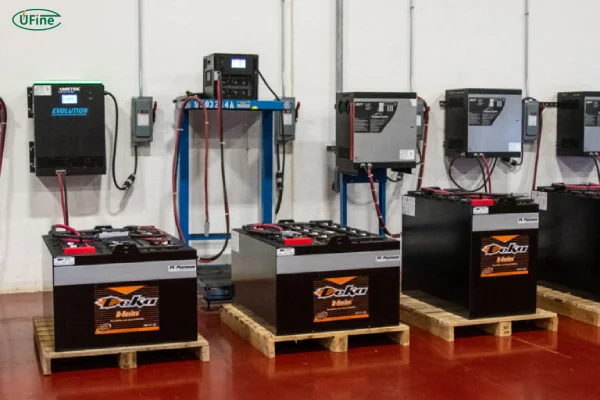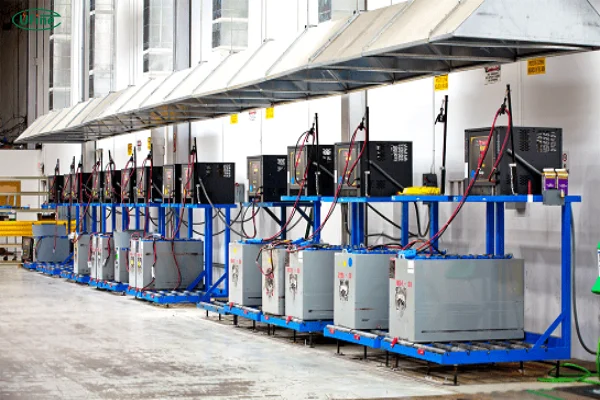Part 1. What are industrial batteries?
Industrial batteries are high-capacity energy storage devices designed to provide reliable, long-lasting power for commercial, industrial, and critical infrastructure applications. Unlike consumer-grade batteries, which are typically smaller and used in personal electronics, industrial batteries are engineered for performance, durability, and energy efficiency in environments that require constant and high energy output.
Key features of industrial batteries include:
- Higher Capacity: These batteries are built to store and deliver much larger amounts of energy compared to regular batteries.
- Longer Lifespan: Industrial batteries are designed for longevity, often lasting for several years or even decades with proper maintenance.
- Robust Performance: They are built to withstand harsh environments, including extreme temperatures, vibrations, and varying load conditions.
- Rechargeable: Many industrial batteries are rechargeable, making them a sustainable option for long-term use.
- Multiple Voltage Options: Depending on the application, industrial batteries come in different voltage levels to meet specific power requirements.
Part 2. Common types of industrial batteries
Industrial batteries come in various types, each suited for different uses. The most common types include:
-
Lead-Acid Batteries: The most widely used industrial battery type, especially in applications such as forklifts, backup power supplies, and uninterruptible power systems (UPS).
-
Lithium-Ion Batteries: Known for their lightweight, high efficiency, and long cycle life, lithium-ion batteries are often used in electric vehicles and renewable energy storage systems.
-
Nickel-Cadmium (NiCd) Batteries: These are commonly used in industries requiring durable and reliable batteries for emergency lighting, aviation, and communication systems.
-
Sodium-Sulfur Batteries: Typically used for large-scale energy storage applications, such as grid balancing and renewable energy integration.
-
Nickel-Metal Hydride (NiMH) Batteries: These batteries are known for their high energy density and are used in various industrial applications, including power tools and hybrid vehicles.
AGM VS Lithium VS Lead-Acid Battery: Comprehensive Comparison
Part 3. Advantages of industrial batteries
Industrial batteries provide a variety of benefits that make them indispensable in many sectors. Some of the key advantages include:
- High Energy Density: They can store large amounts of energy in relatively compact sizes, making them ideal for power-hungry operations.
- Cost-Effectiveness: While the initial cost may be higher, industrial batteries often prove more cost-effective over time due to their long lifespan and low maintenance.
- Durability: Built to last in demanding environments, industrial batteries can withstand temperature extremes, vibrations, and shock.
- Sustainability: Many modern industrial batteries are designed to be environmentally friendly, with options like lithium-ion and lead-acid being recyclable.
- Versatility: They are used in a wide range of applications, from emergency backup power to electric vehicle propulsion.
Part 4. Limitations of industrial batteries
While industrial batteries offer numerous advantages, they also come with certain limitations that need to be considered:
- High Initial Investment: The upfront cost of purchasing and installing industrial batteries can be significant, especially for high-performance models like lithium-ion batteries.
- Maintenance: Some industrial batteries, like lead-acid, require regular maintenance, including checking the electrolyte levels and cleaning terminals.
- Size and Weight: Certain types of industrial batteries can be bulky and heavy, making them less suitable for applications where space and weight are critical factors.
- Limited Lifespan in Certain Environments: Although designed to last long, certain batteries may degrade faster when exposed to extreme heat or cold.
Part 5. Applications of industrial batteries
Industrial batteries are used in a wide range of sectors, where reliable and efficient energy storage is crucial. Some common applications include:
- Backup Power Systems: Industrial batteries are used in backup power solutions, including uninterruptible power supplies (UPS), ensuring continuous power during outages.
- Electric Vehicles (EVs): Lithium-ion batteries are essential in electric vehicles, providing the necessary power for propulsion and energy storage.
- Renewable Energy Storage: Batteries are critical in storing energy generated from renewable sources such as solar and wind, ensuring a stable power supply.
- Forklifts and Material Handling Equipment: Lead-acid batteries are commonly used to power forklifts and other material handling equipment in warehouses and factories.
- Telecommunications: Industrial batteries provide backup power to telecom systems, ensuring uninterrupted communication services.
- Military and Aerospace: Batteries are used in specialized applications, such as providing power to aircraft and military equipment in remote areas.
Part 6. Industrial AA batteries
While AA batteries are typically associated with household devices, industrial AA batteries are a higher-grade version designed for professional and industrial use. They offer superior reliability and are often used in tools, electronics, and other devices where longer battery life and performance are essential. Industrial AA batteries are often made from higher-quality materials, which ensures a longer shelf life and more consistent power output compared to their consumer counterparts.
Part 7. Industrial alkaline batteries
Industrial alkaline batteries are widely used in industrial applications due to their longer lifespan and better performance than standard alkaline batteries. These batteries are ideal for high-drain devices and equipment that require consistent power over long periods. They are commonly used in security systems, medical devices, remote sensing equipment, and other industrial tools. Industrial alkaline batteries are known for their reliability in temperature extremes and demanding environments.
Part 8. Industrial lithium batteries
Industrial lithium batteries have become increasingly popular due to their lightweight design, high energy density, and long life cycle. These batteries are widely used in applications such as electric vehicles, renewable energy storage systems, and critical backup power applications. Lithium batteries are more efficient and have a longer lifespan compared to traditional lead-acid batteries, making them a more sustainable option for businesses looking to reduce energy costs over time.
Part 9. What is the difference between industrial batteries and consumer batteries?
The main difference between industrial batteries and consumer batteries lies in their design, capacity, and intended usage. Here are some key distinctions:
- Capacity and Size: Industrial batteries typically have much higher energy storage capacities compared to consumer batteries, as they are designed to power large machines, systems, and backup solutions.
- Durability: Industrial batteries are built to withstand harsh conditions, including extreme temperatures, moisture, and physical impacts, while consumer batteries are usually designed for everyday devices.
- Cost: Industrial batteries tend to be more expensive than consumer batteries due to their enhanced performance, longer lifespan, and heavy-duty construction.
- Lifespan: Industrial batteries are designed to last much longer than consumer batteries, which typically need to be replaced more frequently.
Part 10. FAQs
-
What is the most common type of industrial battery?
The most common types of industrial batteries are lead-acid and lithium-ion batteries, with lead-acid being widely used in backup power and forklifts, and lithium-ion gaining popularity in electric vehicles and renewable energy storage. -
How long do industrial batteries last?
Industrial batteries can last anywhere from 3 to 20 years, depending on the type of battery and the application. Lead-acid batteries typically last 5-7 years, while lithium-ion batteries can last up to 15 years or more. -
Are industrial batteries rechargeable?
Yes, most industrial batteries are rechargeable, making them more cost-effective and environmentally friendly in the long run. -
Can industrial batteries be recycled?
Yes, many industrial batteries, such as lead-acid and lithium-ion, are recyclable. However, proper disposal and recycling processes must be followed to prevent environmental damage. -
Are industrial batteries expensive?
Yes, industrial batteries tend to have a higher initial cost due to their enhanced features, larger capacities, and longer lifespans. However, their long-term performance often makes them more cost-effective. -
Can industrial batteries operate in extreme temperatures?
Many industrial batteries, particularly lead-acid and lithium-ion batteries, are designed to perform in extreme temperatures, making them suitable for use in various environments, including outdoors and in harsh conditions. -
How are industrial batteries maintained?
The maintenance requirements for industrial batteries depend on the type of battery. Lead-acid batteries need periodic checks for electrolyte levels, while lithium-ion batteries require minimal maintenance but should be monitored for overcharging and deep discharge. -
What safety precautions should be taken with industrial batteries?
Industrial batteries should be handled with care to avoid leaks, corrosion, or overheating. It’s important to store them in a cool, dry environment and follow proper disposal protocols to prevent hazardous accidents.
Related Tags:
More Articles

How to Choose the Best Floor Scrubber Battery for Commercial Cleaning?
Selecting the ideal floor scrubber battery ensures a long runtime, rapid charging, and minimal maintenance for efficient commercial cleaning operations.
Battery for Blower vs Battery for Leaf Vacuum: Which One Should You Choose?
Battery for blower vs leaf vacuum—learn the key differences in power, fit, and runtime to choose the right battery for your outdoor tool needs.
How to Choose the Right Battery for Blower?
Choosing the right blower battery? Consider voltage, capacity, chemistry & usage. This guide helps match the best battery for peak performance.
How to Choose the Best Insulated Battery Box for Lithium Batteries?
Choosing the Best Insulated Battery Box for Lithium Batteries? Discover key factors such as size, material, and safety for optimal protection and performance.
7 Critical Elements on a Lithium Battery Shipping Label
What must be on a lithium battery shipping label? Learn 7 key elements to ensure safety, legal compliance, and correct handling across all transport modes.





